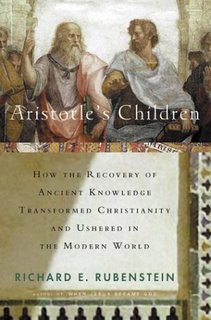What I am reading

Aristotle's Children : How Christians, Muslims, and Jews Rediscovered Ancient Wisdom and Illuminated the Middle Ages by Richard E. Rubenstein
In the vein of returning to basics, I saw this book at a local library and checked it out. It is highly readable and not overly academic, so I recommend it for all people who have at least a rudimentary understanding of Western thought.
One thing that suprised me, though, is that Rubenstein does not cite the work of M.D. Chenu,who was one of the greatest scholars in terms of the transition from a neo-Platonist to a more Aristotlian mode of thought in the twelfth century.
I suppose one thing that is going through my mind as I read this book is my own philosophical pilgrimage. It has been very easy for me to fall into the rather simplisitic Platonist/Aristotilian dichotomy. That is one of the appeals of Eastern Orthodoxy for Western Christians: the accusation that the West fell away from the Fathers of the Church to seek after syllogisms and logical hair-splitting. A very appealing argument, but one that is simply not true. You cannot wish that the Western mind be different , nor can you wish away the 800 year old march of reason that has taken place since Aquinas and the scholastics. To try and do so would be utopian and foolish.
Is it not possible to say, along with Chenu, that the opening up to nature as it happened with the rediscovery of Aristotle in the West led to a real "incarnational" approach to the world that was lacking in the more Augustinian model?



0 Comments:
Post a Comment
<< Home